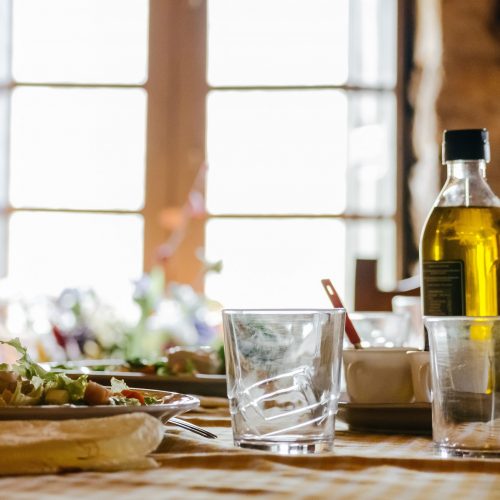As we move into autumn in the Northern Hemisphere, now may be a good time to clean out your cupboard. The turning of the seasons is a great reminder of how things change, sometimes beneath our very nose.
In North America, there is a cultural tendency to buy a nice bottle of fancy olive oil and stash it away for a special occasion. Often such an occasion never comes, or the oil is used only sparingly once.
Unfortunately, like the rest of us, olive oil isn’t immune to the seasons. Once you open it, the oil will never be as delicious as it is today. Using old oil can also be incredibly unhealthy.
Fresh Pressed Fruit
Extra virgin olive oil is essentially a fresh fruit juice, and it will go bad with time. When this happens, the complex fruity flavours and nutritional value of the oil diminishes. And the sweet aroma may quickly turn sour.
Light, heat, and oxygen exposure are all contributing factors that cause olive oil to deteriorate. Of course, it’s impossible to avoid this sort of exposure in the real world. And the longer you hold onto a bottle of oil the more it will break down.
Why Does It Go Bad?
You may have heard about the health benefits of extra virgin olive oil. Fresh olive oil is packed with antioxidants and monounsaturated fats. These fats help with weight loss, decrease inflammation and the risk of heart disease.
It is the deterioration of these healthy fats that causes olive oil to “go bad.” When exposed to oxygen, the monounsaturated fats transform into trans-cyclized- and cross-linked fats. These “damaged” fats are some of the worst you can eat.
Oxidation also replaces the fresh tastes and aromas with rancid flavour and stale smell.
Is Rancid Oil Bad For You?
Yes, oxidized oil quickly becomes damaging to cells in the human body.
The impact on a person’s physical and mental well-being can be extensive. The fatty acids found in rancid olive oil disrupt cellular communication. They also cause problems for duplication and regeneration in tissues and organs. As a body absorbs damaged fats, they spread across trillions of cell membranes throughout the body.
Not only can rancid oil cause cellular damage, but also you’ll miss out on the incredible health benefits of fresh olive oil by using a dated supply. There is an abundant supply of antioxidants in fresh olive oil, including tocopherols, β-carotene, lutein, squalene, lipophilic and hydrophilic phenols. These compounds can protect your body’s cells from the damage of free radicals, so long as your oil is fresh. Olive oil quickly loses antioxidants as it oxidizes.
What Steps Can I Take?
If you would like to dig deeper, you can find a more extensive resource on old olive oil published by Kitchen Ambition. Or here are a few easy takeaways that you can bring into your kitchen,
Choose extra-virgin olive oil.
“Extra Virgin” is the highest global quality grade for olive oil. Most people prefer it to lower grades because of the excellent flavour, nutritional value and shelf life. Extra virgin oils are free from flavour defects and are bottled at a lower level of free acidity compared with other grades. A high-quality extra virgin olive oil should last longer than other grades before deteriorating.
Store your bottle in a cool dark place.
Keep your bottle in a cool dark place where it can remain well-sealed, preferably between 65-75 F. Avoid storing in a window sill or near the stove. Even a small amount of heat or UV exposure from direct sunlight can cause the quality of oil to quickly decline.
Use it, or lose it.
Once you’ve opened a new bottle of olive oil, use it within 60 days. Don’t be shy with your portions. When purchasing a new bottle always check for a “best by” or “harvested on” date. If stored properly, extra virgin olive oil is typically best within 2 years of the time it was picked and pressed.
Don’t pour old oil down the drain.
A common mistake made by many is to simply pour expired oil down the drain. This is a bad idea. Fats, oils, and greases are some of the most common causes of clogged pipes under a kitchen sink. It is possible to compost old oil, although the process is more complex to do right compared with most food scraps.
David Lewis is the founder of Kitchen Ambition, a resource site for home chefs in search of the best tools and ingredients. He resides in the American South.
Blog Image Credit: https://www.kitchenambition.com/wp-content/uploads/2020/07/juan-gomez-sE6ihVGSd1Q-unsplash-1024×679.jpg
 Written by David Lewis
Written by David Lewis


